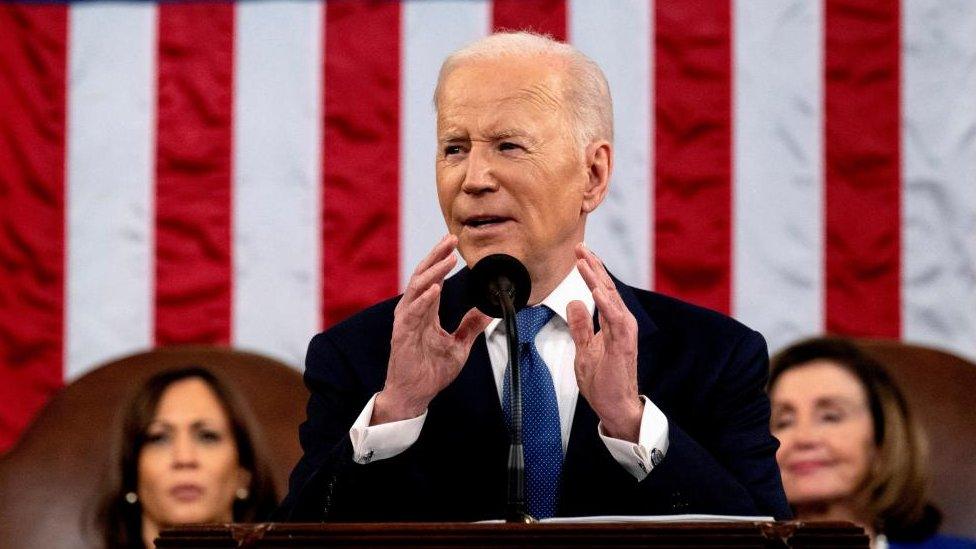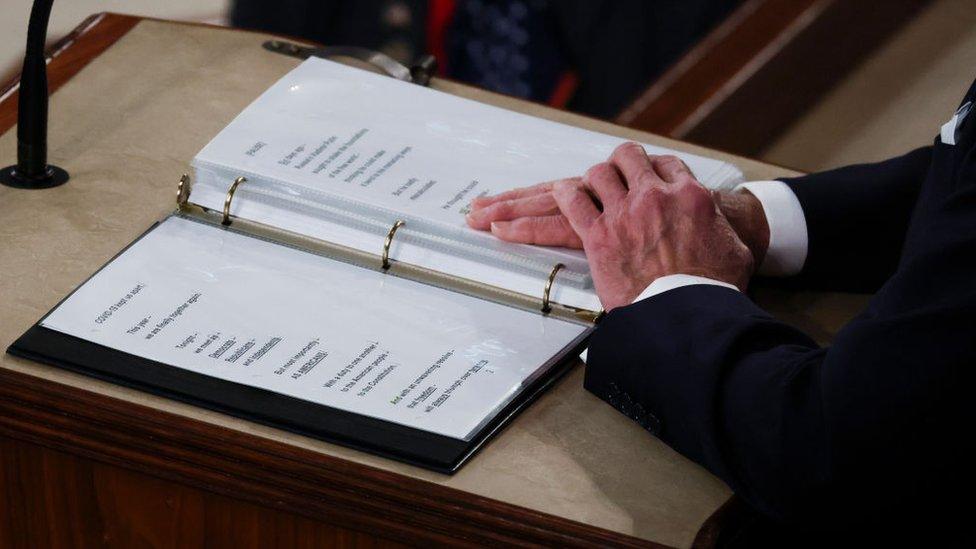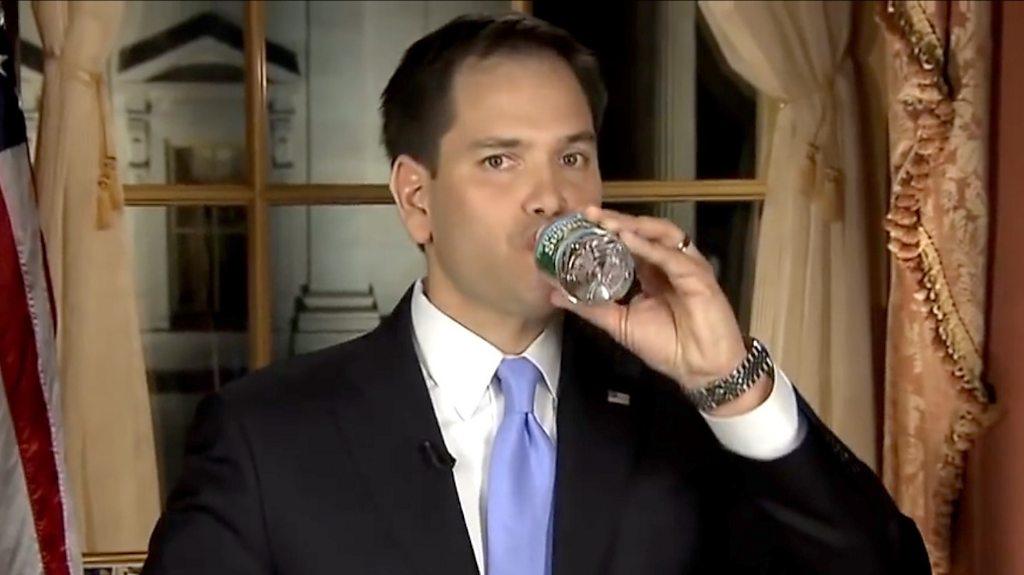State of the Union 2023: Chinese balloon looms large over Biden's speech
- Published

The president will no doubt have to cast his eyes forward and make the case for what he hopes to accomplish
Joe Biden's State of the Union address to Congress on Tuesday comes at a pivotal time in his presidency.
By most indications, he is poised to announce a bid for re-election next year, and the speech provides a high-profile platform from which he can make his case to the American people, the media and key figures within the Democratic Party.
Before the president gets to that, however, he will be under intense pressure to address the issue that has been hovering over his administration since Friday. The Chinese spy balloon, and the US reaction to it, has dominated headlines, captivated the attention of the American public and prompted sharp criticism of the Biden administration from Republicans.
With the Republican-controlled House of Representatives considering holding a vote of disapproval for how the president handled the balloon incursion - on the day of the speech no less - and aggressive hearings into the situation already being planned, Mr Biden will be expected to offer the reasoning behind his decision to shoot the vessel down only after it had traversed the US.
And all eyes will be on how Congress reacts.
While Mr Biden and his advisers may have a strategy devised for how they want to craft his re-election bid, a foreign crisis with China, which could have significant economic and military consequences, could derail even the best-laid plans.
What Biden really wants to talk about
His speech is likely to dwell extensively on accomplishments in the first two years of his presidency, when his party controlled both chambers of Congress and was able to pass a variety of substantive legislation.
Those achievements included a $1.9tn (£1.5tn) coronavirus relief package that featured a programme that halved the US child poverty rate and $1tn in climate and healthcare legislation. He is also sure to tout bipartisan legislative achievements on gun control, infrastructure spending and technology investment.
The president will make the case that the economy is improving under his watch, citing the latest job-growth figures and inflation and energy numbers that have been tapering off from high levels not seen since the early 1980s.
When he's done patting himself on the back, however, Mr Biden will have to cast his eyes forward and make the case for what he hopes to accomplish in the remainder of his first term and what he could offer if he does seek four more years in office after that.
Successful political campaigns, as the established wisdom goes, are about the future, not the past.
To that end, Mr Biden is planning on making the phrase "finish the job" a recurring theme during his speech. It's a call for Congress to do more, but it also gives the president the opportunity to declare some measure of victory if he successfully implements the programmes launched by the Democratic Congress over the past two years.
With the recent spate of mass shootings, Mr Biden may talk about new gun control legislation, including the kind of ban on assault weapons he helped enact as a senator in the 1990s. He may also call for federal law protecting abortion rights, an issue that helped turn out Democratic voters in last year's midterm elections.
Watch: Following the State of the Union speech is no easy task
Government-supported childcare and pre-kindergarten education are also long-desired but yet-to-be tackled components of the Democratic agenda. And, in the wake of the death of Tyre Nichols at the hands of Memphis police, he might endorse renewed efforts to enact federal policing reform.
Mr Biden could also address issues of perceived weakness during his presidency, including rising crime rates in US cities, the rise in undocumented migrants crossing the US-Mexico border and an attempt to forgive some student-loan debt that has faced multiple lawsuits.
While US-China relations are sure to dominate any foreign policy portion of Mr Biden's address, he is also certain to discuss the need for continued American military aid to Ukraine and the effect the tens of billions in aid already approved has had in turning back the Russian invasion.
The reality of a divided Washington
Whatever Biden proposes on any of these issues will crash headfirst into the reality of Republican control of the House of Representatives. Although the conservative margin in that chamber is narrow, it is enough to ensure that none of Mr Biden's ideas will pass, or even receive an up-or-down vote, without tacit Republican approval.
While there is always the possibility of bipartisan agreement - and Mr Biden will do his best to present himself as a voice of reason and co-operation - the coming year is more likely to centre on acrimonious fights over avoiding a US default on its national debt this summer and passing legislation that will fund the US government in the autumn.
Mr Biden may use his address on Tuesday night as a means to gain the upper hand in negotiations that are only just beginning.
The president's speech could provide a blueprint for how he will handle these fraught confrontations with Republicans and address the growing US-China rift. It will also shed light on the terrain upon which he may want to build his re-election campaign, including which issues to prioritise and which accomplishments to trumpet the loudest.
While the delivery of a State of the Union address is always scrutinised, the style of Mr Biden's speech will be almost as important as the substance.
The 80-year-old politician is already the oldest president in US history. If he wins re-election, his second term will expire after he turns 86. Questions about Mr Biden's competence will be unavoidable in the days ahead, and high-profile speeches like this are an opportunity to silence critics - or give them more ammunition.
Although public opinion surveys 21 months removed from an election are of limited value, the latest numbers show that if Mr Biden takes the plunge he is in for a closely contested campaign, with Republicans - including his former adversary Donald Trump - more than capable of wresting the White House from his grasp. His overall approval has improved but is still net-negative. Polling indicates that Democrats would be more resigned to a Biden re-election campaign than energised by it.
Following his address, the president will travel to Wisconsin and Florida - states that are traditional presidential-election battlegrounds and the latter being the home of two possible Republican presidential opponents. Although 21 months may seem like a long time, and the timing of an official campaign announcement has not even been hinted at, Tuesday night's speech is a prominent waypoint on Mr Biden's road to re-election.
- Published4 February 2023

- Published5 February 2023

